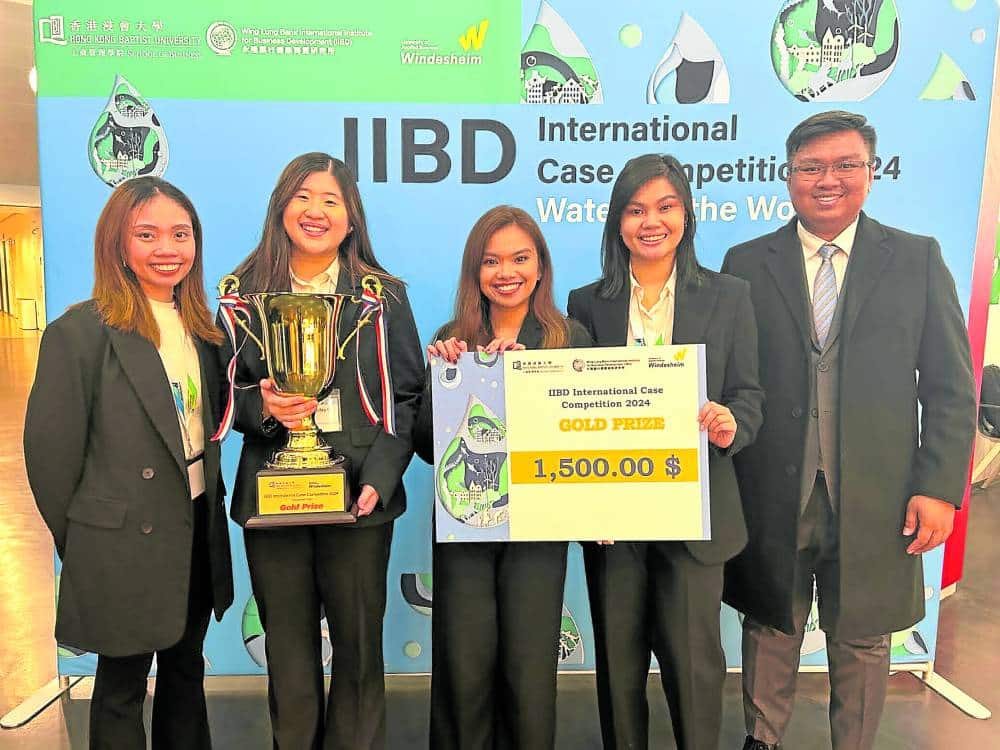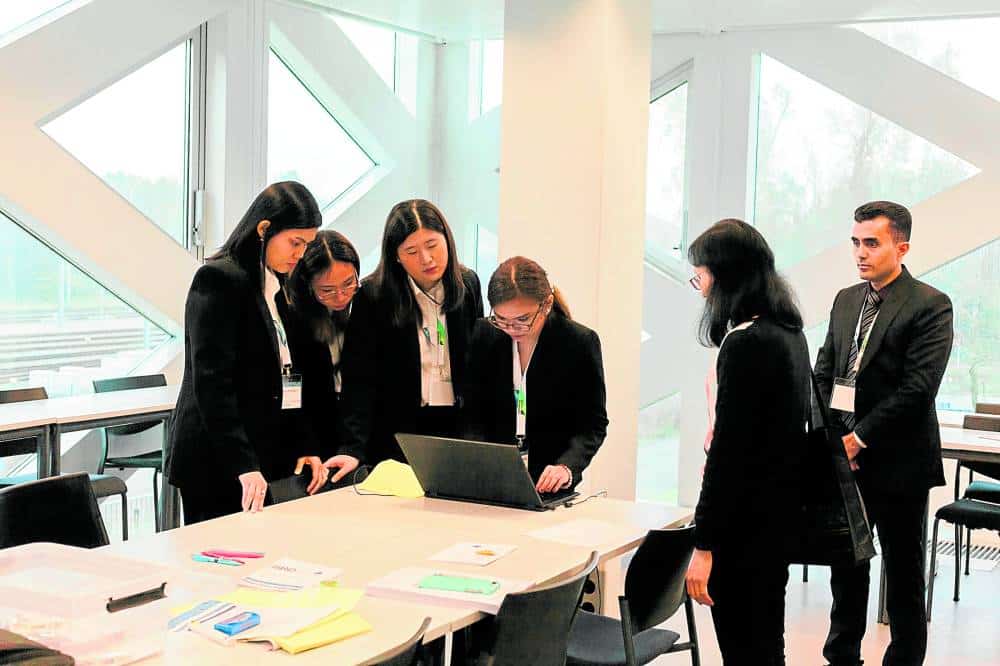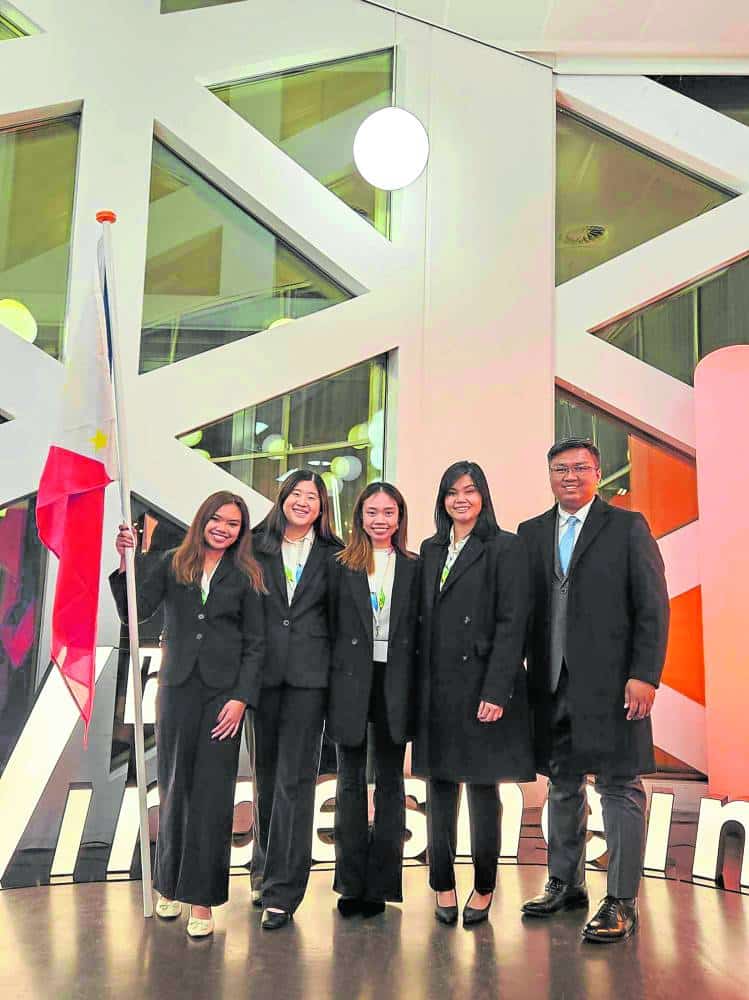UP team wins gold at int’l business case tilt

GIRL POWER The winning UP team members are all smiles as they hoist the trophy and the ceremonial check for $1,500 prize money. From left: Chelsea Denise Cregencia, Aleisha Hailey Ong Uy, Ma. Angelica Grace Rapal, Karla Lorena and coach Mikhael Anjelu Magana—CONTRIBUTED PHOTO
An all-women team of problem-solving business administration and accountancy students from the University of the Philippines-Diliman bagged the gold prize at the 16th Wing Lung Bank International Institute for Business Development (IIBD) International Case Competition held in the Netherlands.
The team is composed of Chelsea Denise Cregencia, Karla Lorena, Ma. Angelica Grace Rapal and Aleisha Hailey Ong Uy, who were coached by Mikhael Anjelu Magana.
Their winning presentation during the final round held at Windesheim University of Applied Sciences on Nov. 7 was about an American fresh produce company that’s considering to pivot to indoor farming.
The UP team bested four other teams from Ateneo de Manila University, University of New South Wales, Thailand’s Thammasat University, Hong Kong Baptist University and Windesheim School of Applied Sciences.
Teams from Ateneo de Manila University and University of New South Wales received the silver and bronze prize, respectively.
IIBD International Case Competition is a “unique platform” for students from member and nonmember universities worldwide to apply their knowledge and creativity in solving real-life business issues. Each team was given five hours to research, analyze, develop a set of action plans and make recommendations. The business case was only revealed on the day of the competition.
Long journey
Team members tell the Inquirer that they went through physical and emotional whirlwind before reaping the fruits of their labor.
For each business case dissected, each team was given 15 minutes to present their recommendations, and grilled by panelists for another 20 minutes.
The theme of this year’s competition was “Water for the World.”

BRAINSTORMING Using only one laptop, the UP team was able to create a clear storyline and propose solutions to a simulated business problem. —Windesheim University of Applied Sciences
“We believe our success can be attributed to the strong bond we formed as a team and the compelling narrative we weaved throughout our presentation. From the in-depth analysis to the innovative strategies, we presented a cohesive and persuasive case,” says the 23-year-old Cregencia.
Uy, 21, explains that prior to the final round, they analyzed 20 cases during their two-month weekend training sessions, each of which lasted up to 15 hours. These were on top of juggling their academic requirements as graduating students of Bachelor of Science in Business Administration and Accountancy.
In the first round, the case was to determine how a market-leading Mexican water product and services provider could help solve Mexico’s water crisis via wastewater treatment solutions.
“We had already established our roles so that on the day itself it would be clear who would be in charge of which part. Not only that, the team was very comfortable in bouncing off each other idea’s … so we could reach a clear strategy,” 22-year-old Rapal explains.
Much to their relief, the team breezed through the first round. Their secret weapon? Establish a clear storyline early on. “[We] should be able to make it clear what the problem was, why it is such a big problem, what solutions can solve it, and how these solutions actually solve the problem,” Rapal says.
In making their recommendations, the team drew from existing best practices from other countries.
“The model and the case study built upon both the clarity, feasibility and credibility of our strategy. One of the unique points of our presentation was also an extensive financial analysis on the impact of our strategies to the company,” she says.
After the first round, the team had to wait for more than two months for the announcement of the finalists. There were a total of 51 universities from 20 countries that participated this year.
When they were told they made it to the finals, it felt surreal, Cregencia recounts.
“I felt ecstatic, excited for what’s to come, and the growth we were bound to see as we prepare for the competition,” she adds.
Coach Magana, an assistant professor at the UP Cesar E.A. Virata School of Business and director of the undergraduate programs, filled in the gaps to further hone the team.
“The training would usually last the whole day, answering two cases, spending three to five hours to prepare for each case. We did our best to simulate the rigor of the actual competition,” he adds.
In addition, Magana would “throw hard and unexpected questions, critique and argue against their analysis and recommendations, and let them defend their own ideas.”
Uy describes their coach as a “dependable figure.” Not only was he always present during their marathon weekend trainings, but also provided vital research materials and even invited faculty members and industry professionals as panelists during practice sessions.
Best presenter

FLAG-BEARERS The team members went through a rigorous training program wherein they had to analyze 20 cases and defend their ideas before a panel during practice presentations. —CONTRIBUTED PHOTO
Lorena, 22, who was also awarded as the best presenter, narrates that they were a bunch of nerves during competition day.
Magana believes the team stood out as they raised critical and realistic points synergy within a conglomerate setting while considering financial limitations of the subject entity.
When a panelist questioned Lorena on whether there’s any advantage in working with an all-women team, she replied that being an overthinker was actually an advantage.
“They used this ‘overthinking’ to make sure that they considered all the relevant facts presented in the case, which ultimately made their recommendations well-grounded,” Magana says.
Uy says the team naturally spent a lot of time on the nitty gritty, using these details to analyze thoroughly and validate the data through research to help them make informed decisions.
“It was terrifying to think that, as unfortunate as it sounds, only a win gives credit to all your hard work,” Lorena says.
“They are a brilliant team skills-wise, but their drive to succeed in the competition was the ultimate deciding factor. Representing the Philippines on the world stage was already something to be proud of, but they did not stop there. They really wanted to win!” Magana says.
